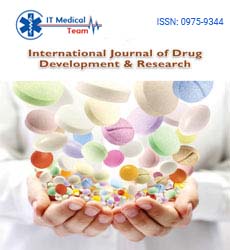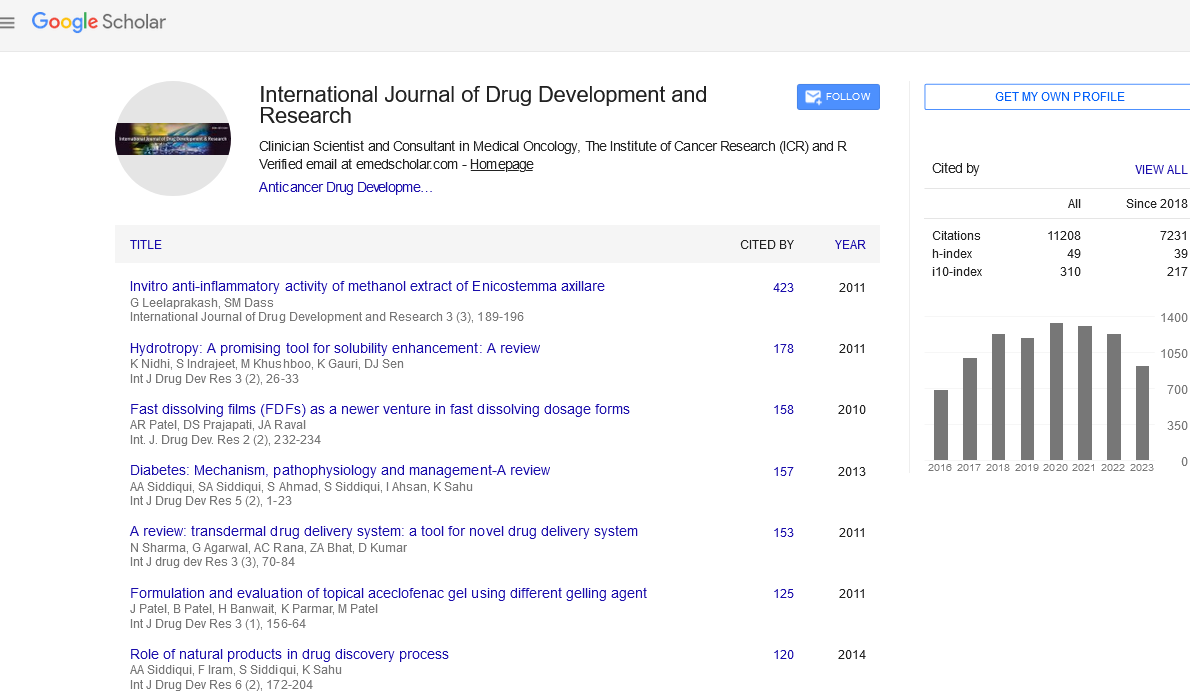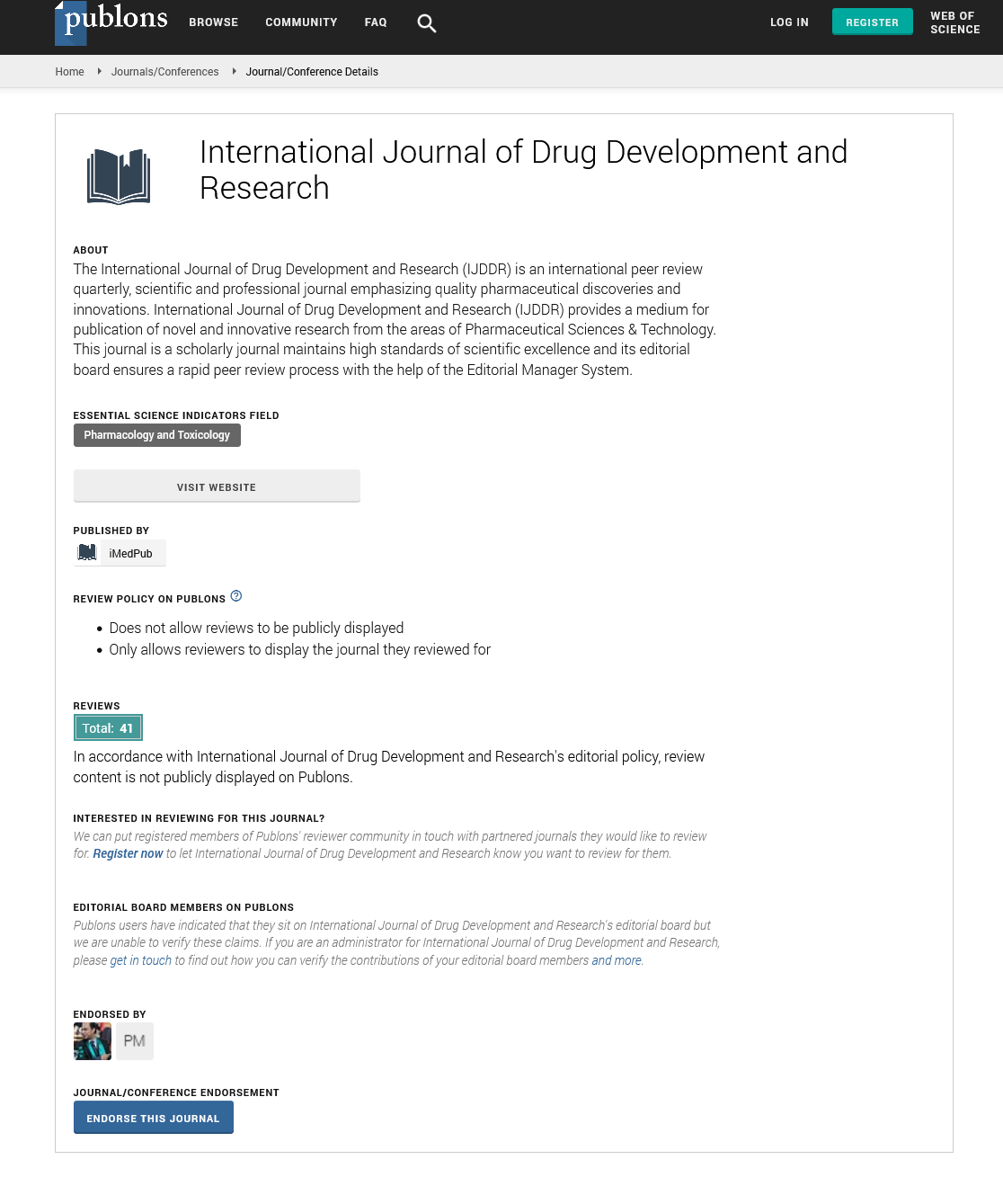Perspective - (2024) Volume 16, Issue 5
Role of Artificial Intelligence in Drug Discovery and Development
Hyunang Lee*
Department of Pharmacy Practice, Osaka University, Lagos, Japan
*Correspondence:
Hyunang Lee, Department of Pharmacy Practice, Osaka University, Lagos,
Japan,
Email:
Received: 09-Sep-2024, Manuscript No. IJDDR-24-15195;
Editor assigned: 12-Sep-2024, Pre QC No. IJDDR-24-15195 (PQ);
Reviewed: 16-Sep-2024, QC No. IJDDR-24-15195;
Revised: 10-Oct-2024, Manuscript No. IJDDR-24-15195 (R);
Published:
17-Oct-2024
Introduction
In recent years, the integration of Artificial Intelligence (AI)
into drug discovery and development has heralded a paradigm
shift in pharmaceutical research. AI technologies, leveraging vast
datasets and advanced computational techniques, are redefining
how new drugs are discovered, tested, and brought to market.
This article explores the multifaceted role of AI in this domain,
highlighting its impact on efficiency, accuracy, and innovation.
Description
The evolution of drug discovery
Traditionally, drug discovery has been a lengthy and costly
process. It involves multiple stages: Identifying potential drug
targets, screening compound libraries, conducting preclinical
studies, and performing clinical trials. Historically, this process
was predominantly empirical, relying heavily on trial and error
approaches that often led to high failure rates and significant
financial investments.
AI, with its ability to analyze complex datasets and identify
patterns, is transforming this process. By employing machine
learning algorithms and other AI techniques, researchers can
now make more informed decisions, streamline workflows, and
potentially reduce the time and cost associated with bringing a
new drug to market.
Accelerating target identification
One of the earliest and most critical steps in drug discovery is
identifying the biological targets associated with a disease.
Traditionally, this task relied on experimental methods and
extensive literature reviews. However, AI has revolutionized this
phase by enabling researchers to analyze large scale omics data
(genomics, proteomics, etc.) and identify potential targets with
greater precision.
AI algorithms can process vast amounts of genetic, proteomic,
and metabolic data to uncover new drug targets. For example,
deep learning models can identify gene expression patterns
associated with specific diseases, helping researchers pinpoint
potential targets that may have been overlooked using
conventional methods. This approach not only accelerates the
identification process but also enhances the likelihood of
discovering novel targets with high therapeutic potential.
Enhancing drug screening
Once potential drug targets are identified, the next step is to
screen compound libraries to find molecules that interact with
these targets. Traditional high-throughput screening methods
involve testing thousands of compounds in laboratory settings,
which can be time-consuming and expensive.
AI has introduced innovative methods to optimize this
process. Virtual screening, powered by AI, allows researchers to
evaluate large chemical libraries in silico (using computer
simulations) before conducting physical experiments. Machine
learning models trained on known interactions can predict how
new compounds will interact with specific targets, significantly
narrowing down the number of compounds that need to be
tested in the lab.
Moreover, AI-driven algorithms can analyze chemical
properties and molecular structures to predict potential drug-like
characteristics and optimize compound properties. This
approach not only accelerates the screening process but also
enhances the likelihood of identifying promising drug
candidates.
Optimizing drug design
AI is also making significant contributions to the design of
new drugs. Traditional drug design often relies on iterative
processes, where chemists modify existing compounds to
improve their efficacy and reduce side effects. This process can
be slow and labor-intensive.
In contrast, AI-powered drug design utilizes computational
models to predict how modifications to a compound's structure
will impact its interaction with the target. Generative models, a
subset of machine learning, can design novel molecules with
desired properties by learning from existing data on successful
compounds. This approach allows researchers to explore a vast
chemical space and identify new candidates that may have been
missed using traditional methods.
Additionally, AI can assist in optimizing drug formulations by
predicting how different formulations will affect drug stability,
solubility, and bioavailability. This capability not only speeds up the drug development process but also improves the chances of
developing effective and safe drug products.
Improving clinical trials
Clinical trials are a critical phase in drug development, where
new treatments are tested in human subjects to evaluate their
safety and efficacy. However, designing and executing clinical
trials is complex and often fraught with challenges, including
patient recruitment, data management, and trial design.
AI has the potential to address many of these challenges. For
instance, AI algorithms can analyze Electronic Health Records
(EHRs) and other patient data to identify suitable candidates for
clinical trials based on specific criteria. This approach can
accelerate patient recruitment and ensure that trials are
conducted with a representative sample of the population.
Furthermore, AI can enhance trial design by simulating
different scenarios and predicting outcomes based on historical
data. This capability allows researchers to design more efficient
trials, optimize dosing regimens, and reduce the likelihood of
unforeseen issues.
AI is also playing a role in monitoring clinical trials in real-time.
Advanced analytics can identify patterns and trends in patient
data, enabling early detection of adverse events or efficacy
issues. This capability allows for more timely interventions and
adjustments to the trial protocol, improving overall trial
outcomes.
Addressing drug repurposing
Drug repurposing, the process of finding new uses for existing
drugs, is another area where AI is making an impact.
Repurposing can be a cost-effective way to develop new
treatments, as it involves leveraging existing drugs that have
already been tested for safety.
AI can analyze existing drug databases and medical literature
to identify potential new indications for approved drugs. For
example, machine learning algorithms can uncover hidden
relationships between drugs and diseases, suggesting new
therapeutic uses that may not have been considered previously.
This approach can expedite the development of new treatments
and provide valuable options for diseases with limited treatment
options.
Enhancing drug safety
Ensuring drug safety is paramount in drug development.
Adverse Drug Reactions (ADRs) and other safety issues can derail
development programs and impact patient health.
AI can enhance drug safety by predicting potential ADRs
based on historical data and molecular information. Predictive
models can identify compounds that are more likely to cause
adverse effects, allowing researchers to address safety concerns
early in the development process. Additionally, AI-driven
pharmacovigilance systems can analyze real-world data from
various sources, such as social media and patient reports, to
identify and monitor safety issues post-market.
Future prospects and challenges
While AI holds immense promise for drug discovery and
development, there are still challenges to overcome. Ensuring
the quality and diversity of data, addressing ethical
considerations, and integrating AI tools into existing workflows
are key areas that require attention.
As AI technology continues to evolve, its integration into drug
discovery and development is expected to deepen. Advances in
AI algorithms, data availability, and computational power will
likely drive further innovations, leading to more efficient and
effective drug discovery processes.
Conclusion
Artificial Intelligence is revolutionizing drug discovery and
development by enhancing target identification, optimizing drug
screening and design, improving clinical trials, and addressing
drug repurposing and safety. By leveraging AI technologies,
researchers can accelerate the discovery of new drugs, reduce
costs, and ultimately bring innovative treatments to patients
more quickly.
The integration of AI into pharmaceutical research represents
a significant advancement, offering the potential to transform
how we approach drug development. As AI continues to evolve
and its applications expand, the future of drug discovery holds
exciting possibilities, promising a new era of more efficient,
targeted, and effective therapies.
Citation: Lee H (2024) Role of Artificial Intelligence in Drug Discovery and Development. Int J Drug Dev Res Vol:16 No:5






